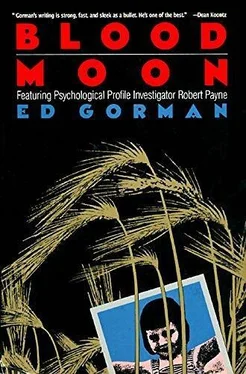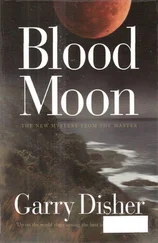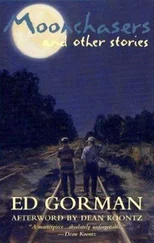Has all this been in vain?
Goddamn cowboy, anyway. Why do they have to hire goons like that for prison guards?
And then he smiles: yeah, why don’t they hire some real nice understanding liberal hand-wringers as prison guards?
Wouldn’t that be nice?
He’s in the backseat now, thinking all these things, blood all over him now, consciousness waning quickly, laughing to himself about his notion of hiring liberal hand-wringers.
And then he’s pissing his pants.
And then he’s crying.
And then he’s freezing his ass off.
Never actually heard his teeth chatter before, but that’s exactly what they’re doing now.
In prison one day, a would-be intellectual inmate said to him, “You know, we’re nothing more than blood and bones and shit and piss and come. Not one thing more.”
He never understood what the hell the guy was talking about.
Till now.
When he could feel various parts of his system shutting down, as if he were some vast complex engine that was ceasing to function.
Aw, hell. Please not now. Not after Rosamund worked so hard to put this together.
The three guys pile into the car, then.
Chevy hauls ass away, squealing rubber and two or three metal-bang shots into the trunk of the car.
“You goddamn idiot,” one of the guys says, hysterical, he’s hysterical, “you killed two guards. All we was supposed to do was cover him so he could make a break for it.”
“We just gotta stay cool,” one of the other three in the front seat said.
“Yeah,” said a third voice, “stay cool. Use our heads and not panic.”
“They’re gonna fry us for killin’ a guard like that,” the hysterical one said. “You just wait and see.”
But the talk fades as he plummets deeper into the darkness of pain and blood loss and the breakdown of his human engine.
Deeper...
“Are you sure you’re up?”
“I’m sure.”
“I can always call back.”
“No, Sheila, really, this is fine.”
“I found out some things about Tolliver.”
“I’m listening.”
Sunlight traced the edge of the motel-room curtains. I’d set my travel alarm, but dimly remember stomping it into silence with the heel of my hand and then going back to sleep.
But the intrepid Sheila Kelly was now going to make sure that I was awake for sure.
“You ready?”
“I’m ready.”
“He nearly went broke in 1963. He had been CEO of his father’s trucking business for three years, and the whole thing came tumbling down.”
“But he made it?”
“He’d fired a man named Farraday, a man who’d always been his father’s right-hand man. You know how it is with young CEOs, they don’t want any reminder of the previous regime.”
“You think Farraday’s being fired hurt the company?”
“No doubt about it. Farraday went all the way back to the beginning of the trucking industry, back when the Teamsters were still blowing up trucks that weren’t registered to union members. This Farraday knew all the routes and all the federal regulations, and how to make money on what they call short hauls. In other words, he was a very important guy.”
“And Junior fired him?”
“Right. But then Junior must have had a religious conversion because he hired him back at three times the salary.”
“Wow.”
“He also gave him ten percent of the net profits per annum.”
“Sounds like Farraday had really been mad about being canned.”
“Very, very angry. But since he now had ten percent of the company, he made it work again. He stayed there until he died of lymphatic cancer in 1979. By then, Junior had figured out how to run things himself. He was making a lot of money again.”
“How about personal life?”
“A widower. His wife died in a sanitarium, in 1983.”
“A mental hospital?”
“No. Some kind of fancy drying-out place for the idle rich. You know, people like you.”
“What was her name?”
“Kendra. She was a runway model in Chicago when Tolliver married her in 1958.”
“Any children?”
“One. A boy named Craig.”
“Tolliver said he’s dead.”
“He is. And guess how he died?”
“How?”
“In a prison escape.”
“Tolliver had a son who was in prison?”
“Second-degree murder. Really cut up this sixteen-year-old girl. They found what was left of her in chunks and pieces buried next to a river. Tolliver had to use all his money and influence to get the charge reduced to second-degree.”
“He didn’t try insanity?”
“Oh, he tried, but the district attorney wouldn’t go for it. Or did I mention this wasn’t Tolliver’s home state? He might be important in Iowa, but not in Illinois. Anyway, Tolliver tried to get Craig declared insane and put in a state mental hospital, but the DA wasn’t buying, and neither was the judge or jury. Tolliver’s people finally had to plead him guilty of second-degree.”
“How long was he in before he escaped?”
“Three-and-a-half years. But there’s something else.”
“What?”
“You remember that word you asked me about, ‘Conmarck’?”
“Right.”
“That’s the name of the town where the prison is located. It’s in Illinois.”
“Wow. Then Vic knew something about the escape.”
“Vic?”
“This Nora I told you about?”
“The one who claimed to be Tolliver’s daughter?”
“Right. She had this assistant named Vic. He’s the one who used the word.”
“Well, Conmarck was where Craig died, anyway. Three guys were supposed to cover him while he ran from a soybean field, but one of them killed a guard. Craig was shot in the crossfire. He died in the backseat of the getaway car. His three friends died a few miles later in a shootout with a highway patrol helicopter.”
“So there’s a connection between Nora and Vic and Tolliver after all.”
“What?”
“Just thinking out loud, Sheila. Sorry. You’ve really earned your money.”
“I just hope it helps.”
“It helps a lot. Just send me the bill to my Charlesville address.”
“If you need something else, let me know.”
“I will, Sheila, and thanks again.”
“And here’s the old biplane that Curtis Lefler built,” Herb Carson said an hour-and-a-half later, as he finished giving us the tour of his aviation museum.
Curtis Lefler was another Iowa flying legend, having built this and half-a-dozen pioneering airplanes in his father’s garage.
So far this morning, we’d seen several planes, including a very rare Whitey Sport with its 55-horsepower LeBlond engine, but this was the one I fancied.
Seeing it there in the sparkling sunlight, with a cloudless blue sky like this one, recalled the days of the barnstormers, men and women (there were a lot more female barnstormers than is commonly believed) who bought used WWI planes from the U.S. Government then went all over the countryside putting on shows at carnivals and county fairs, or putting down in a field and taking people for a ride for $3.75 a head.
“She’s a beauty, isn’t she?” Herb said. He looked older than the last time I’d seen him, and that was a sad realization. I was at the age when most of my heroes were dying on me, Herb among them. In his blue turtleneck and jeans, his white hair burred military-style, his skinny frame bent now with age, he looked like the last of the barnstormers surveying a world that no longer knew what to do with him.
Читать дальше









